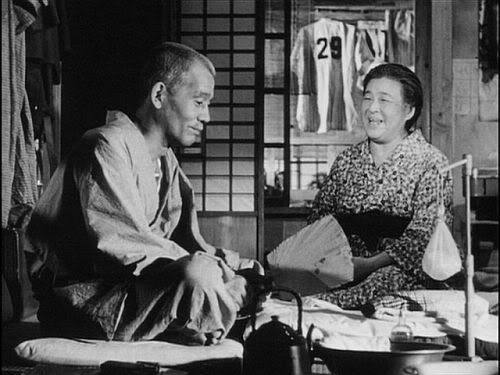 I just rewatched the great Ozu film Tokyo Story and I feel like I got a lot more on the rewatch than my initial viewing. This is a kind of film that the impatient and restless would claim "nothing happens" but yet everything does. The characters engage what appears to be "mindless chit chat" but what they say reveals much about their character. Upon rewatch, for example, I think it might be possible that the mother knows that she is ill, yet does not want to burden anyone with her problems. There are some moments where she mentions death and "if something should happen to her" that implies she might know, yet we are never really sure.
I just rewatched the great Ozu film Tokyo Story and I feel like I got a lot more on the rewatch than my initial viewing. This is a kind of film that the impatient and restless would claim "nothing happens" but yet everything does. The characters engage what appears to be "mindless chit chat" but what they say reveals much about their character. Upon rewatch, for example, I think it might be possible that the mother knows that she is ill, yet does not want to burden anyone with her problems. There are some moments where she mentions death and "if something should happen to her" that implies she might know, yet we are never really sure.It's sad to see how these two parents are treated by their kids--not badly, but merely indifferently. They keep shuffling them around from house to house, unsure what to do with them. Yet the father also admits, when he gets drunk with his friends, that his kids too have disappointed him--such as his son, the doctor, who is only "a small country doctor" and nothing more.
Also, the parents seemed relieved that their kids turned out "better than most" and they are satisfied by their being "better than average." It shows the mentality of people, how so often success is valued not by what one does, but what one does relative to others.

In Dan's review of the film he notes:
" It is not a film that provides easy answers, and it lacks all the phony sentimentality and contrivances Hollywood films wallow in. It is not melodramatic in the least. When Shige, as example, bursts out in tears, when Koichi says their mother has not long to live, it is not Ozu’s melodrama, but the character’s own, and there is a huge difference in recognizing that. That the film so perfectly captured all the Japanese conventions of the era, yet still resonates with worldwide audiences, is the mark of a great work of art, and a testament to the great circularly narrative screenplay by Ozu and Kôgo Noda, which deftly interweaves symbolism, such as train tracks and laundry, while capturing the way real people talk and react. Never is there a forced moment nor false reaction. The character building is superb, and the very relaxed and slow pace of the film shows what such a style can do. The film’s score, by Kojun Saito is a tad over the top, at times, but understated far more often than not."
But here is the trailer you should watch: